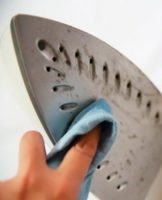How to properly maintain, clean and store dishes at home
Proper care of kitchen utensils will extend their life and preserve their attractive appearance for a long time. Let's consider how to store and care for dishes made of various materials, so that when using and washing it does not damage its inner and outer surfaces. As well as common mistakes housewives make when using household chemicals and other cleaning products.
Rules for the care and storage of kitchen utensils made of various materials
Caring for kitchen utensils means carefully removing the remains of burnt-on food, choosing a good detergent. In order for the dishes to retain their presentable appearance longer, a metal scraper and abrasive materials should be used as little as possible.
Stainless steel
Stainless steel pans occupy the predominant place in the kitchen. Preference for such utensils is given due to the durable and strong material, but violation of the rules of care causes the appearance of stains and damages the top layer.
You can remove burnt-on food from stainless steel without using a metal scraper by adding club soda and pouring boiling water.
After that, food debris is removed with a sponge. Stubborn stains are cleaned with the same products, but after adding the ingredients, the dishes are put on fire and boiled.
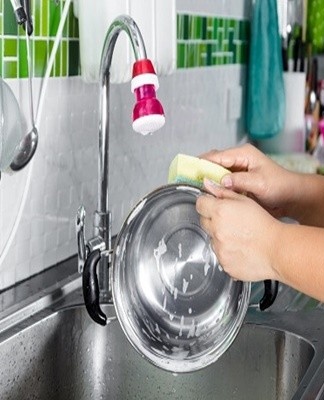
Aluminum
It is not recommended to store food in aluminum containers. In order to use white metal utensils for a long time, they cannot be cleaned with acid and salt. Use an onion to remove food debris. Putting it in a saucepan, you need to pour water, boil. After complete cooling, all that remains is to wash the dishes in warm water, without abrasive detergents and without a scraper.
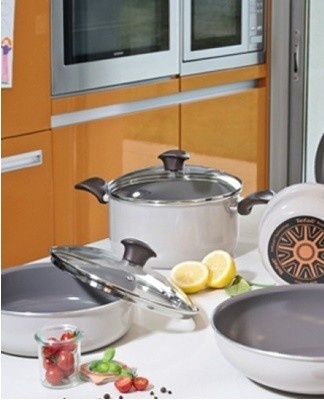
Clay
Those who prefer to cook in clay pots know that they wash in soapy water. To remove heavy dirt, a paste of baking soda is applied to them. The use of household chemicals is only allowed for bowls that have a glazed surface. Another rule is that the containers should always be opened to avoid unpleasant smells.
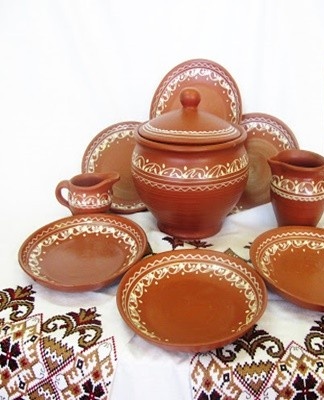
In wood
Wooden kitchen utensils are afraid of water, so it is not recommended to soak them or put them in the dishwasher. The devices are carefully washed after use and then wiped dry. It is best to use a soft, absorbent cloth to remove the liquid. Use abrasive cleaners, a hard scraper is not recommended. The best cleanser is baking soda. You can not store food in wooden utensils, put it in the microwave and refrigerator.
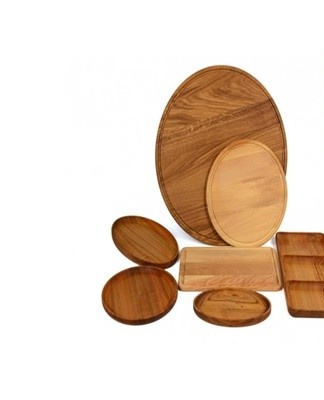
Glass
Refractory glassware has been in high demand in recent years.For kitchen utensils to shine like new, they should be washed in salt water or vinegar. Soda diluted in water helps remove stubborn dirt. Heat-resistant glass pans can withstand high temperatures and can be placed in the dishwasher. After washing, the glass is not wiped, but left to air dry.
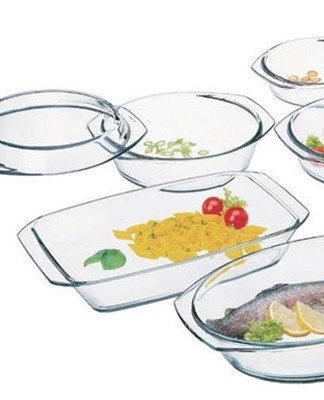
Common Mistakes
Even the sturdiest kitchen utensils can deteriorate if not properly handled and maintained. Improper operating conditions dramatically reduce the life of your favorite utensils.
Dishwasher storage
Storing dirty dishes in the dishwasher leads to the growth of pathogenic bacteria and fungi. They are dangerous for humans and are resistant to high temperatures. In addition, food debris dries up, not all dirt is removed. The remaining pieces of food will burn during the next cooking.
abrasives
Metal scrapers, which many use to remove carbon and dirt, wear down kitchen utensils. Professional chefs avoid the use of abrasives so they don't spend a lot of money buying new pots and pans.
cold salt water
Table salt and foods high in salt have a devastating effect on stainless steel. Therefore, dishes should be salted only after boiling. It is also not recommended to store marinades, salty vegetables and acidic foods in saucepans. This leads to the formation of small depressions in the form of dots on its surface.
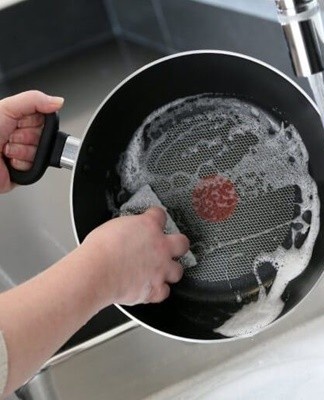
Overheat
Too high a temperature degrades the coating - performance is lost, color changes.Stainless steel utensils are covered in rainbow stains.
Aggressive chemistry
Powdered dishwashing detergents are composed of abrasive substances that not only clean dirt, but also damage the surface.
How to properly clean metal utensils at home
Stainless steel cookware requires regular cleaning. Proper containment conditions will prolong its life. Maintenance tips :
- stainless steel kitchen appliances must be washed by hand, even if the operating rules do not prohibit doing so in the dishwasher;
- clean dishes with lukewarm water, a soft sponge and liquid detergent;
- hard sponges, abrasive products, metal scrapers scratch the coating, it is not recommended to use them;
- after washing, wipe the dishes with a napkin, not in circular movements, but pointwise. The cause of stains on utensils is due to minerals in the water.
To keep the shine of the dishes for a long time, use raw potatoes. It is cut into 2 slices and the surface is wiped with it.
Tips & Tricks
If kitchen utensils are treated carelessly, their life is greatly reduced. Maintenance tips :
- it is undesirable to wash hot dishes, you need to let the bottom stop;
- you can not leave empty dishes on the fire;
- Using detergents and high temperatures when washing cookware in the dishwasher will tarnish.
Despite the fact that most dishwasher manufacturers recommend washing in the dishwasher, experts advise washing by hand to reduce wear and maintain their appearance for a long time.



